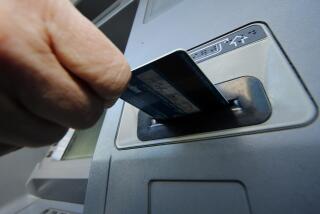Computer Chips May Shift Tide of Battle in War on Credit-Card Fraud
- Share via
COLORADO SPRINGS, Colo. — Credit-card fraud is one of the fastest growing underworld industries in the country. Some estimates place the loss at more than $200 million a year for MasterCard, Visa and other companies.
Criminals manufacture counterfeit plastic cards, steal cards or their identification numbers, even swipe the information on a credit card’s magnetic strip.
The growth in credit-card fraud has made another industry much more attractive--credit cards that have built-in security devices. As credit-card losses continue to climb, so does interest in these “smart” cards.
MasterCard and Visa, which between them have more than 200 million cards, are searching for some way to stop the fraud. So is nearly every other major credit-card issuer.
The focus so far has been on ways to make it impossible to skim the information from a card’s magnetic strip, and on the use of microchips with specially coded information stored in the card itself.
The so-called “French card,” being developed in the United States by Micro Card Technologies, and another card being produced by Japan’s Casio Computer have attracted attention.
Looks Like Calculator
Another alternative is soon to be offered by a tiny Colorado Springs company started five years ago by a hotel and restaurant manager. The company, Intellicard International, is developing a credit card that will look like a small calculator, complete with a key pad and liquid crystal display.
Intellicard, which plans to have a prototype ready for testing this summer, has had some interest from Visa International, according to William Neumann, Visa’s vice president for security operations. Neumann said Visa is looking at other cards, as well.
Sue Skiffington, public relations manager, said Intellicard “is completely self-run.” Besides its own microchip memory, it has its own battery and does not need any other piece of hardware to function. It is compatible with existing card-reading devices, such as magnetic strip readers or blind embossers.
“That means any company that uses the Intellicard would not have to go out and spend a fortune on new hardware,” she said.
The heart (or brain) of the Intellicard is the memory chip, which can be used to store information peculiar to the person who is issued the card, as well as the issuing agency. The information could include a personal identification number and a credit limit.
Could Self-Destruct
When a customer presents the card for a purchase, the key pad would be used to punch in the personal identification number. The card’s display would respond to show the store the card was valid, issuing an authorization code. If the correct identification number was not used, the memory chip could be made to self-destruct.
The Intellicard also has a device to be used on telephone orders to ensure security, a Transaction Identification Code the merchant would use in conjunction with his own code to verify the card was valid.
In addition to its use as a credit card, the Intellicard can be used as a check-guarantee card, an access card and a debit card, Skiffington said.
She said Intellicard was nearing agreement on contracts with two major banks for use of nearly 60,000 of the cards, once testing is completed. A letter of intent also has been signed with a security access company in California for 50,000 cards, she said.
Obviously, a contract with a giant such as Visa International would practically ensure the success of Intellicard, but Skiffington said it was too soon to tell how negotiations would go.
Intellicard was founded in 1980 by Pierre Pavlov, who has owned or managed hotels and restaurants in Lakeland, Fla.; Colorado Springs; Reno; Lake Tahoe; Denver, and St. Paul, Minn. The company went public last December, with net proceeds of slightly more than $2 million.
More to Read
Inside the business of entertainment
The Wide Shot brings you news, analysis and insights on everything from streaming wars to production — and what it all means for the future.
You may occasionally receive promotional content from the Los Angeles Times.










